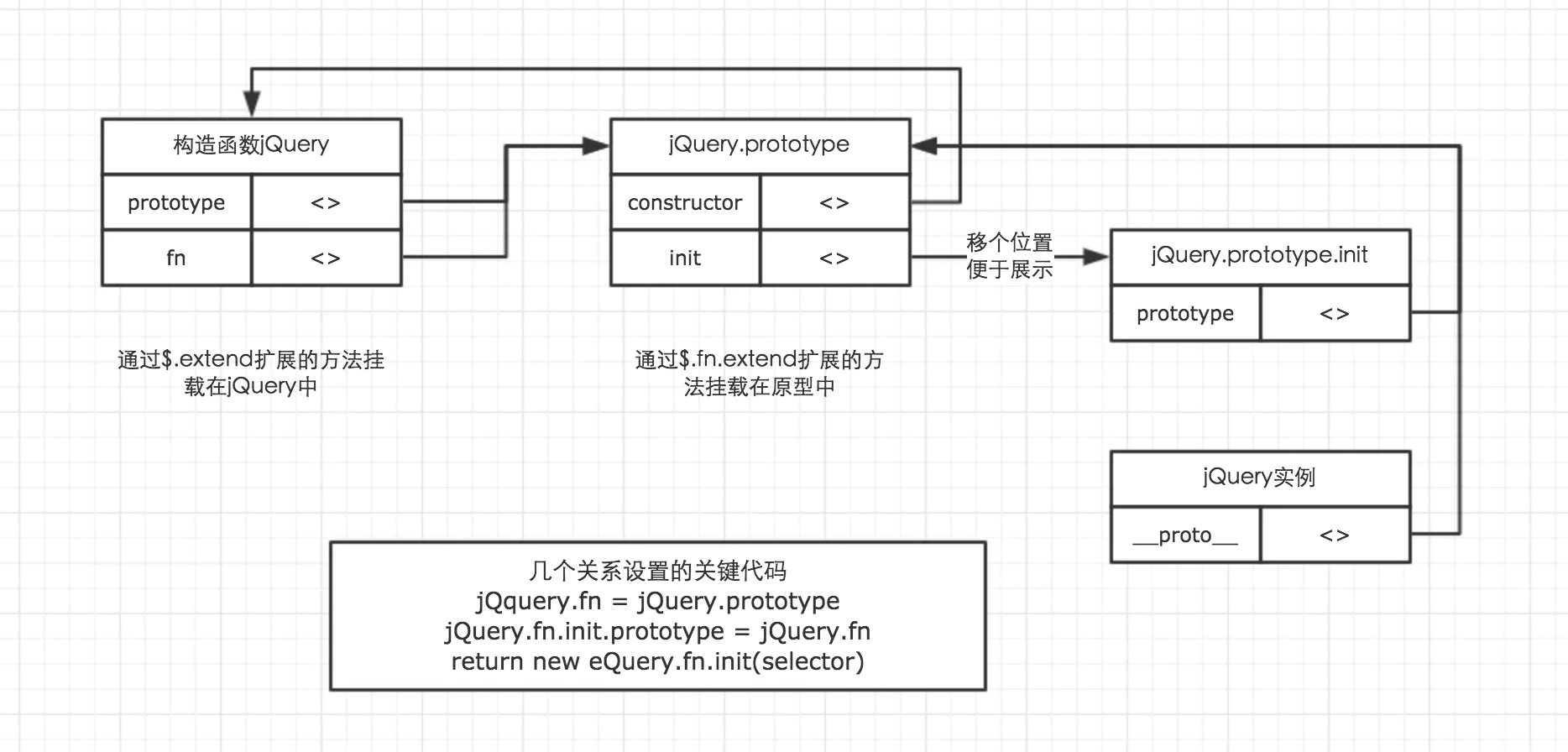jquery 简化版代码
;(function (ROOT) {
// 构造函数
var jQuery = function (selector) {
// 在jQuery中直接返回new过的实例,这里的init是jQuery的真正构造函数
return new jQuery.fn.init(selector)
}
jQuery.fn = jQuery.prototype = {
constructor: jQuery,
version: '1.0.0',
init: function (selector) {
// 在jquery中这里有一个复杂的判断,但是这里我做了简化
var elem, selector;
elem = document.querySelector(selector);
this[0] = elem;
// 在jquery中返回一个由所有原型属性方法组成的数组,我们这里简化,直接返回this即可
// return jQuery.makeArray(selector, this);
return this;
},
// 在原型上添加一堆方法
toArray: function () { },
get: function () { },
each: function () { },
ready: function () { },
first: function () { },
slice: function () { }
// ... ...
}
jQuery.fn.init.prototype = jQuery.fn;
// 实现jQuery的两种扩展方式
jQuery.extend = jQuery.fn.extend = function (options) {
// 在jquery源码中会根据参数不同进行很多判断,我们这里就直接走一种方式,所以就不用判断了
var target = this;
var copy;
for (name in options) {
copy = options[name];
target[name] = copy;
}
return target;
}
// jQuery中利用上面实现的扩展机制,添加了许多方法,其中
// 直接添加在构造函数上,被称为工具方法
jQuery.extend({
isFunction: function () { },
type: function () { },
parseHTML: function () { },
parseJSON: function () { },
ajax: function () { }
// ...
})
// 添加到原型上
jQuery.fn.extend({
queue: function () { },
promise: function () { },
attr: function () { },
prop: function () { },
addClass: function () { },
removeClass: function () { },
val: function () { },
css: function () { }
// ...
})
// $符号的由来,实际上它就是jQuery,一个简化的写法,在这里我们还可以替换成其他可用字符
ROOT.jQuery = ROOT.$ = jQuery;
})(window);
关键代码
jQuery.fn = jQuery.prototype
jQuery.fn.init.prototype = jQuery.fn

jQuery构造器
jQuery使用非常方便,其中一个原因就是我们在调用的时候并不需要使用关键字new来创造一个jQeury对象,直接使用jQuery(“#id”)或$(“.class”)就可轻松得到一个新的jQuery对象。原因就是jQuery使用工厂方法,利用构造器创造一个新的jQuery对象并返回,省去了用户的new操作。
一般构造器
var $ = jQuery = function() {
return new jQuery();
}
jQuery.prototype = {
jquery: "1.11"
};
console($().jquery);
一个构造器返回利用它自身创建了一个新的对象并返回,这样形成了一个死循环,产生栈溢出的异常。
为了解决循环,就必须在jQuery.prototype中定义的一个构造器,这就是jQuery.fn.init了。
var $ = jQuery = function() {
return jQuery.fn.init();
}
jQuery.fn = jQuery.prototype = {
init: function(){
return this;
},
jquery: "1.11"
}
虽然这个方法解决了嵌套为问题,也将jQuery的原型方法传递给了jQuery对象,但它是将一个完整的jQuery.prototype暴露处理,jQuery的任何对this关键字的操作,实际上就是直接在jQuery.prototype上进行操作,那么jQuery.fn的完整性很容易就被破坏了,jQuery对象之间也可能产生不可预估的影响。
为了避免直接返回jQuery.fn,我们需要借鉴一开始使用关键字new的方法,通过new创建一个新Oject,改变了this所指向的对象,从而避开对jQuery.fn的直接暴露。
var $ = jQuery = function() {
return new jQuery.fn.init();
}
jQuery.fn = jQuery.prototype = {
init: function(){
this.num = 2015;
return this;
},
jquery: "1.11"
}
但此时问题来了,new jQuery.fn.init()所返回的新对象并没有继承jQuery.fn,因为jQuery.fn.init.prototype仅仅是指向了一个function对象的原型,并不包含jQuery.fn。
既然jQuery.fn.init.prototype只是指向了Object.prototype,那么我们只需要改变它的指向,让它指向jQuery.fn不就好了吗?
jQuery.fn.init.protoytpe = jQuery.fn;
总结
- jQuery.prototype,挂载jQuery对象的原型方法
- jQuery.fn是jQuery.prototype的别名,方便使用
- jQuery.fn.init.prototype,则是为了让jQuery.fn.init这个工厂方法的实例均能够继承jQuery.fn上的原型方法。
